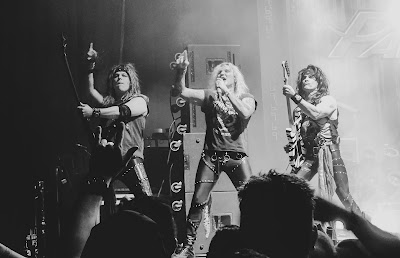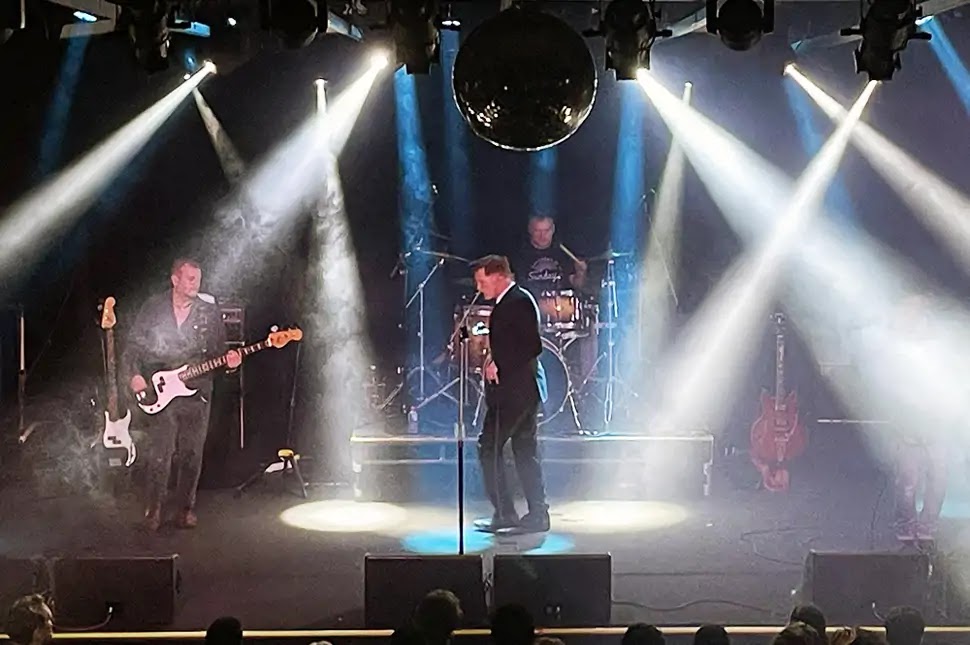Northcote Theatre
If there is any fatigue from the deluge of concerts and festivals lately, it’s not showing here tonight as a sold-out Northcote Theatre welcomes a rare hometown show for one of the city’s most beloved bands. “Playing Melbourne shows used to be every week for us,” says Cut Copy frontman Dan Whitford. “Now it’s every five years. It makes me reflect on the time we spent together. We dreamed of playing The Tote one day. We’ve still never played The Tote, to be honest,” he laughs, “but we’re here tonight. Thanks for supporting us all this time.”
The densely packed crowd cheers this mid-set confession. From the beginning, we are united by a strong work Christmas party vibe and gently glued to the venue floor by a combination of spilled beer, Red Bull and sticky mixers. There is a sense of gentle euphoria and release that matches the band’s glistening tones, warm burbling synths, easy tempos, and Whitford’s voice that, even 18 years on from their breakthrough album, never outstays its welcome. You could be fooled into thinking of Cut Copy as a band with six albums from which only a few banging choruses have entered the public consciousness, but tonight they prove they have a depth that few bands could rival. I’m still not sure what one fan meant when she shouted to a friend, “I hope they play the eighties song,” but it’s a safe bet that whatever she’s referring to is a glorious example of modest synth-pop with an understated chorus and a killer drop.
The set begins with the slowly swelling Cold Water, a low-key scene-setter for Feel The Love, the opening track from Cut Copy’s best-known album, the near-masterpiece In Ghost Colours. It’s the first of many instances in which the band demonstrates their approach to tension and release. Whitford knows how to deploy the components of a song to maximum effect with minimum effort. He never strains for a hook; they arrive. For a band with such metronomic music, their songs never sound stolid or forced. Guitarist Tim Hoey and bassist Ben Browning play like they’re in Sonic Youth, their slashing moves almost unrelated to the song being played. Their leads could be running a few hundred metres down the road, their sound coming out of amplifiers at the Northcote Social Club. But it doesn’t matter, they match the energy and vibe of the song, and they look extremely cool doing it.
Love Is All We Share gets ultra violet lights to go with its pulsing bass swells and a sensitivity that evokes early nineties Pet Shop Boys, but the audience uses any slowing of rhythm or dip in volume as an invitation to chat. As soon as we get another classic from In Ghost Colours, in this case, Out There On The Ice, attention is wrested back to the stage. The band deliver another example of an insistent verse, a hook-driven chorus and a teasing drop that turns the venue into a forest of arms and phones, the chorus builds up to transforming the place into a sweaty nightclub.
It’s a pattern repeated throughout the set. The slower tempos and Balearic sound of the newer songs are interspersed with crowd-pleasing bangers, and it works beautifully. Corner Of The Sky, Lights and Music, Saturdays, Need You Now, and the closing Hearts On Fire get such a visceral response from the crowd even the guy with another guy on his shoulders is jumping and is airborne. Every part of the show is so well thought out, from the setlist to the lights, to the pacing, to the moments Whitford engages with the crowd. It all speaks to a quiet intelligence that feels rare in this fast-changing scene. There is never any sense of desperation or fear of losing attention. Beats are insistent, not urgent or assaulting, Whitford’s voice always in his sizeable comfort zone. Tracks from their 2020 album Freeze Melt sound cleaner and more concerned with an internal journey than a dance floor. These newer songs, like the encore Running In The Grass, are built on gorgeous harmonies and driven by concerns that, at least to an audience eager to revisit 2008, feel a little lost. But, on headphones, walking home through dark streets, they act as a perfect flip-side to a barnstorming homecoming show and make you glad for the continued existence of Cut Copy.
.jpg)








